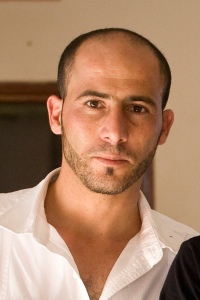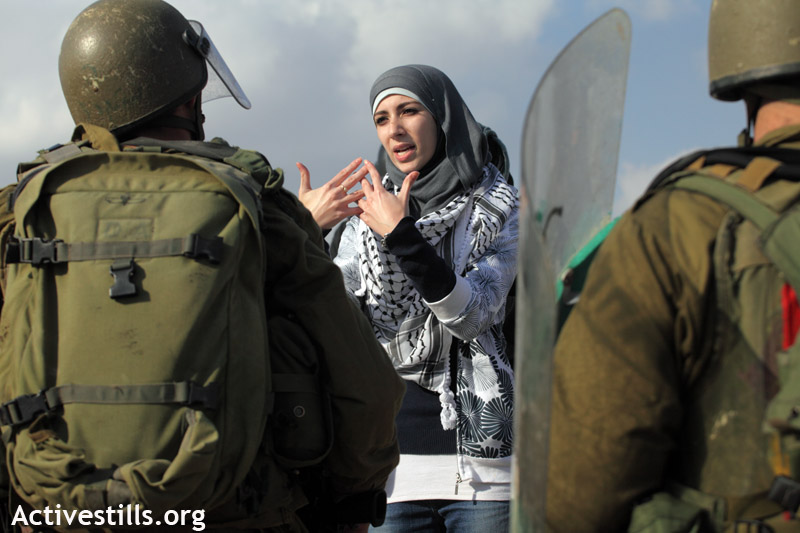"We lived in a state of normalization. We had settlers coming to buy from Palestinian grocery stores. It was like we accepted the occupation. The occupation would always take and take and take, but there wasn't a strong enough reaction from the Palestinians. That is, until the intifada happened."
This is how Mama starts off reminiscing about the first intifada, which exploded on December 9th twenty-four years ago. Her eyes are bright, and her voice is excitedly animated as she recalls random memories of the first three years of the intifada, which she witnessed from living in the Khan Younis refugee camp.
My mother got married and moved from Ramallah to the Gaza strip where my dad's family were. In refugee camps, the action was always brewing due to a number of elements. People in refugee camps generally suffer more because of the memories of dispossession coupled with their current cramped and squalid living conditions weigh heavily on their shoulders. The refugees and their descendants live with the knowledge of having a bleak future, so even though resisting Israel by staging demonstrations, rock throwing, and spraying graffiti on buildings elicited a strong and disproportionate reaction from the Israeli Occupation Forces (Yitzhak Rabin's Bone Breaking policy comes to mind), the general attitude among these Palestinians was, "We already have it bad, how worse could it get?"
Palestinians living in the cities had relatively more stable lives, so there was a lot more to lose. As Mama put it, "في المدن كان الخوف اكثر ولكن التضحية اقل"
Mama kept emphasizing over and over how the intifada was a true popular uprising in every sense of the word. "It united people. Every house shared the same experience; every family had a martyr, a prisoner, an injured person. The best thing about the Intifada was that it broke the fear barrier and ended the barefaced normalization."
"Everyone would participate," she continued. "Everyone! Men, women, children were all seen on the streets demonstrating. There was a harmonious unification of all the political factions. Statements would be released in the name of all factions, and they would all be in agreement about the time of strikes and protests."
She remembers how at first, the Israeli soldiers would walk around in groups of three, four, or five. Once a soldier walked astray from his group and found himself inside a chicken coop. He was petrified, and literally pissed himself from fear. From that day on, there were now twelve soldiers in one group.
I pressed her to divulge some personal experiences. She was silent for a moment, before suddenly bursting out laughing.
"One time a group of soldiers barged into your grandparents' house and began asking each of your uncles what they did for a living. When they got to your father he replied, 'I sell chickens at the souk.' I wanted to laugh so badly. They believed him and thankfully left without destroying anything. They were known for going inside the kitchen and spilling the olive oil on the floor, mixing sugar with salt, ripping open the bags of flour...your grandmother and I were each wearing a dayir [a full black skirt with deep pockets] to hide all our gold in."
"We were under curfew so many times. The soldiers would come rumbling in their tanks, not jeeps, and the whole house would shake like a leaf. They would announce the curfew in the early hours of the morning, always coupled with the foulest language ever. You son of a... and Your mother's..."
I always find it a bit rich for my parents to stir up a World War III at home every time I announce my decision to go to the village of Nabi Saleh the next day for their weekly protests. They weren't some squares quaking from fear during the intifada. When Mama was 8 months pregnant with my older brother, she walked into the Nasser Hospital in the hopes of glimpsing those who were martyred or injured on that day. Doctors thought she was there to give birth but she shook her head and said, "No, no. I just want to have a look."
I asked her if she could envisage another true popular uprising, another intifada. It doesn't make sense to me, how twenty four years later we are still more occupied than ever before and living under the most atrocious conditions. Of course, Salam Fayyad's economic normalization under the guise of "state-building institutions" is partly to blame, along with the Palestinian Authority's collaborative and corrupt nature and Hamas' self-centered sanctimonious interests. Before launching into yet another diatribe about the dangerous failure of this so-called Palestinian leadership, I'll end with Mama's answer.
"Listen, after the on-going Arab revolutions, anything is possible. I for one had no hope in Egyptians revolting on a mass scale. But they did. Then I shared in the opinion that the Syrians were too depoliticized and wouldn't revolt, but they did. We had a huge chance of another intifada during the Gaza massacre in 08/09. But the PA brutally suppressed us. It just goes to show you that everyone cares only about the seat they hold. But a day will come, soon enough."







